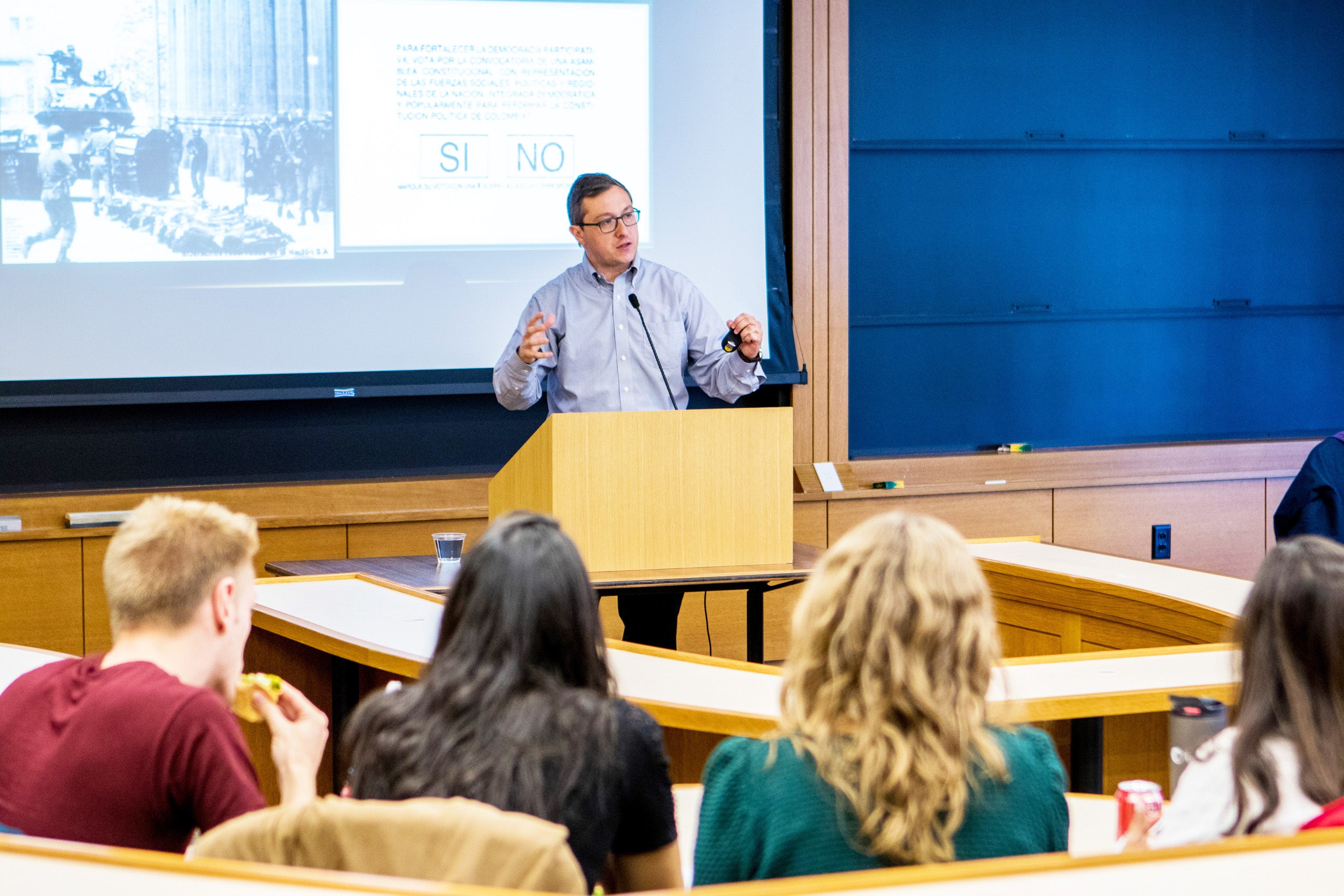As a Harvard Law School student from Colombia, Jorge Gonzalez S.J.D. ’13 was inspired by the interdisciplinary approach so many at Harvard brought to studying law. “In the Global South, legal education tends to be centered on the classical areas of law — you study a specific area, such as property or constitutional law, which then becomes the focus of your career,” he said. “At HLS, it was about fields of inquiry that crossed disciplinary boundaries, and having a global perspective.”
Now, as an associate professor and head of the department of law and legal history at Universidad Javeriana in Bogotá, Gonzalez is deploying that interdisciplinary approach in his own teaching and curricular development, translation work, and research.
With his colleagues at Javeriana, Gonzalez is reducing rigid degree requirements and designing a new curriculum that connects social justice and human rights issues with different fields, such as transnational law. At the same time, he is transcending geographic, cultural, and linguistic boundaries by translating work by Harvard Law professors Duncan Kennedy and Samuel Moyn into Spanish. “In Latin America, it’s mainly elites who get access to these types of sources written in English, so the work of translation is about democratizing access to information,” said Gonzalez. “That is what I like about translating.”
Gonzalez’s dissertation, which was published by Javeriana and launched at the Bogotá International Book Fair last April, focuses on the historical relationship between authoritarianism and constitutional doctrines in Latin America. His current research continues that exploration. “My dissertation was a historical inquiry, and now I’m turning to the present to examine in a much more detailed way about how constitutional power has been, and is, deployed.”
In October, Gonzalez visited HLS to speak to students, faculty, and staff about authoritarianism in Latin America, the use of constitutional power, and his ongoing debate with his close friend and colleague, David Landau ’04— “a partnership that began here, on the streets of Cambridge,” Gonzalez said.
Landau was a Climenko Fellow during Gonzalez’s time at HLS and is now a professor and associate dean at Florida State University College of Law. He theorizes that would-be dictators have moved from seizing power via sheer force (coups) to more subtle means (such as constitutional amendments), which can work to undermine democracy and keep autocrats in power. This “abusive constitutionalism,” according to Landau, is particularly difficult to detect, prevent, and solve. Gonzalez, however, sees it as a more complicated phenomenon with deep roots in history and an intricate relationship with shifts in economic development. “Latin America has a long history, even tradition, of abusive constitutionalism, which we need to explore more thoroughly to really understand.” Gonzalez said.
Pointing to a photo of a Chilean Supreme Court Justice legitimizing Augusto Pinochet with a presidential sash hours after his 1973 coup, Gonzalez elaborated on those historical complexities. “Pinochet used the constitutional jargon of states of exception to justify his coup, and it was blessed by the Chilean Supreme Court. He then appointed a commission to explore the scope of emergency powers in the constitution. These were very complex discussions about the role of law and the constitution.”
Gonzalez then discussed how Hugo Chavez’s alterations to the Venezuelan constitution both bolstered his party’s power and brought about economic reforms. “Chavez challenged the Global North’s recipe for development, leading Latin America toward global competition and export-led development. He was considered an authoritarian character, but he also was a real reformer,” Gonzalez said. “Reading him is very paradoxical.”
Gonzalez urged the audience to look deeper when considering these persistent issues, and posed the question of whether we may be asking too much of constitutional law to serve as a mechanism for curbing abuse when it itself can be used toward abusive ends.
During his visit to HLS, Gonzalez also spoke with LL.M. students about his own experience as a student and how that time shaped his career. “It’s very challenging, writing in another language and the sheer volume of information one takes in—but it is also really constructive. I wanted to tell [the students] that it would all work out,” he said.
Gonzalez recalled Professor Janet Halley’s advice: “When we found ease in our writing and studying, that was when we’d know that we had found our subject area for concentration,” he said. “And somewhere in that first year, I got to a place where things were enjoyable and flowing. It was hard work. It was stressful. But at the same time it was a lot of fun and I found the congregation.”
That congregation was the graduate student community. “Throughout my studies at HLS it was about supporting each other. A small group of us would meet every morning in the library, discuss what we were going to cover that day, and then work, talking through the difficulties and challenges as they came up.”
Gonzalez continues to build his community through networking and engaging in global debates, strengthening his partnership with Landau, and deepening his HLS connections through continued translation work and dialogue with Professors Kennedy and Moyn. “My time here really pushed me to have that global perspective,” Gonzalez said. “And that’s shaped what I’ve been doing ever since.”
